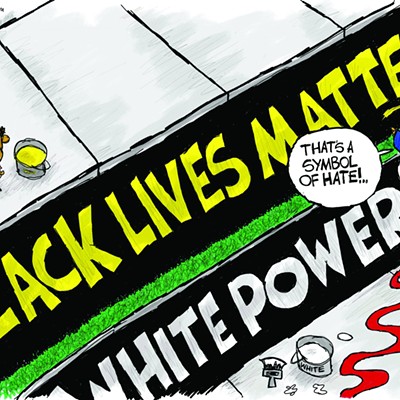Bobman, director of Tucson's Israel Center, then invited internationally renowned cartoonist Michel Kichka to speak at the Jewish Community Center on Thursday, Feb. 9. Kichka's visit to Tucson just happened to coincide with embassy burnings and riots in numerous countries, by Muslims who felt cartoons originally published in a Danish newspaper were sacrilegious.
"The world crisis of cartoons--who would believe it?" Bobman said.
Kichka, the Belgian-born son of a Holocaust survivor who immigrated to Israel in 1974, is the chairman of the Israeli Cartoon Association and a freelance illustrator. He stopped off here on his way to San Francisco to attend the opening of a political-cartoon exhibit covering Israeli news of 2005 and early 2006--from Israeli withdrawal in Gaza and the West Bank, to Prime Minister Ariel Sharon's defection from the Likud party.
In early 2006, Sharon suffered a serious stroke, and Hamas won Palestinian elections. "All that we thought we had achieved in 2005 is once again a big question mark," Kichka said.
Although the Danish cartoons didn't come up during his speech, Kichka did talk about his personal cartooning philosophy, as he went through slides of his and some colleagues' work. To him, there are certain "red lines" cartoonists shouldn't cross for the purposes of political expediency.
He said he would never equate anyone with Hitler. And he castigated Brits for giving Dave Brown the 2003 Political Cartoon Society award for a cartoon of Sharon eating a baby, modeled after the painting "Saturn Devouring One of His Sons" by Francisco Goya.
"If you want to know the definition of going too far--it's the definition. It's also a lie," he said. "Why did the British give this person the first prize? And the answer is: It's politics." He said it was the same type of "political manipulation" that was behind giving Michael Moore the Palme d'Or at the 2004 Cannes Film Festival for the mediocre Fahrenheit 9/11.
He indicated after his speech that political motives were likely to blame for much of the violence over the Danish cartoons. Kichka said the angry reactions of Muslims the world over are "an extreme expression of the clash of civilizations," with countries like Iran and Syria stoking the flames to prop up shaky regimes.
"We don't have to be naïve and think that 12 cartoons can do this," he said. "There's something deeper than the cartoons."
But he offered no excuses for the upheaval: "Even if you are badly offended, let's suppose, it cannot justify such violence."
Kichka said he had seen all the Danish cartoons, "and some of them simply aren't good; some of them aren't funny."
Of one cartoon, in which a turban-wearing man in heaven begs suicide bombers to stop because no virgins remain to greet them as promised, he said: "At the beginning of the Intifada, that was already a bad joke."
Israelis have long endured political cartoons in the Arab press that are at least as offensive as the Danish illustrations. And although most Israelis are cognizant about what is published in the Arab world, Kichka said it would be foolish to respond to them.
After all, cartoonists have a weapon that is just as potent as their illustrations.
"I am aware of one thing: When you draw someone, you give him publicity," he said. "When you draw someone, even badly (negatively), you prove that he exists. If you don't draw him, he doesn't exist."
Kichka took Iranian President Mahmoud Ahmadinejad to task for his public statements, especially after he questioned whether the Holocaust occurred. "I think it's so frightening to listen to him that the best thing to do is cartoon him," he said.
A public figure who has frequently been subjected to Kichka's pen is Ariel Sharon. Kichka said that as an illustrator, he appreciated the now-incapacitated prime minister because of the attributes that make him an easy target of satire: his weight, his age and his good humor.
One cartoon from around April of last year showed Sharon and fellow Likud party member (and current party leader) Benjamin Netanyahu wearing the same pair of swimming trunks, but diving in opposite directions--foreshadowing the party's split later that year.
After the rupture, Kichka drew Sharon as a grinning bull walking away from Netanyahu, who is wearing a toreador outfit. Between the two is a message that Sharon has left Likud in the form of a steaming pile of bullshit.
Kichka seemed resigned to the idea that he had lost a favorite subject.
"I'm almost sure he will not recover," he said. "I don't believe in miracles. I will miss him as a cartoonist, because he was easy to draw."
Acting Prime Minister Ehud Olmert, looking small and fragile in one of Kichka's drawings as he sits at Sharon's desk (which is semi-circular to accommodate his belly), is not as easily defined as a personality.
Kichka also talked about events in the United States and the country's relationship with Israel.
President George Bush is a living "icon" of America, Kichka said. He showed a cartoon in which Bush has a listening device pressed to Uncle Sam's back as Uncle Sam reads the Constitution (a reference to the domestic-spying controversy).
Another depicted a monkey-like Bush waving a white cloth on a rooftop as throngs of dark-skinned people mill about beneath him. Kichka said Bush was "calling God for help."
Pointing to a cartoon by Avi Katz depicting Bush carrying Sharon--who was wearing a wedding dress--across the threshold of a honeymoon suite, he said, "The United States and Israel are good friends that sometimes behave like a couple."
Cartoonists across the globe are friends in that they have similar goals, Kichka said. It's a brotherhood that's always trying to push the boundaries and distill complex issues, even if cartoonists live in countries that clamp down on speech freedoms.
"I think that what they (cartoonists) share is to tell their truth, because politicians are speaking programs and promises," he said. "We are trying to show that the king is naked, to undress them and show them as they are.
"By showing cartoons in which we criticize ourselves, we show the best face of Israel. That is what I believe."












